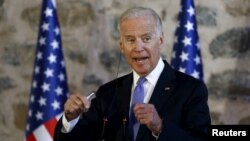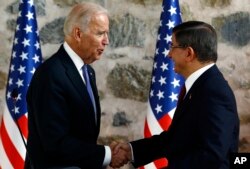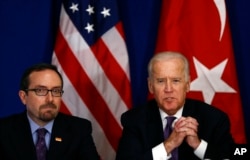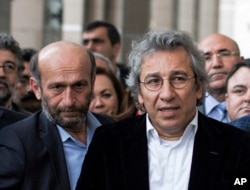U.S. Vice President Joe Biden told Turkey on Saturday that the United States recognizes that the Kurdistan Workers Party (PKK) is as much a threat to Ankara as Islamic State militants are, even as Washington supports Kurdish forces fighting the jihadists in Iraq.
Biden was in Istanbul for meetings with Prime Minister Ahmet Davutoğlu and President Recep Tayyip Erdogan, ahead of efforts next week to begin international talks on Syria’s future.
After meeting with the Turkish prime minister, Biden said Islamic State fighters are "not the only existential threat to the people of Turkey. The PKK is equally a threat and we are aware of that. It is a terror group, plain and simple, and what they continue to do is absolutely outrageous."
No denunciation of People’s Protection Units
Turkish observers noted that Biden did not also denounce the Syrian Kurdish militia known as the People’s Protection Units, which Ankara opposes as strongly as it does the PKK. The militia, known as YPG in Kurdish, is the armed branch of Syria’s powerful Kurdish Democratic Union Party (PYD).
Militants from the Kurdistan Workers Party have battled against the Turkish government for the past 30 years, fighting for autonomy for southeastern Turkey’s Kurdish majority. The PKK also has actively fought against Islamic State militants in northern Iraq, aided by U.S. air support.
Davutoglu defended Ankara's controversial troop deployment into Iraq in December, which has drawn repeated protests from Iraqi leaders in Baghdad. The prime minister said Turkey respects Iraq’s sovereignty, and that its troops are targeting Islamic State.
Biden said he discussed with Davutoglu how Turkey can help Sunni Arab forces in Syria in their fight against Islamic State and to oust Syrian President Bashar al-Assad. Islamic State controls a wide swath of northern Iraq and Syria — a self-proclaimed “caliphate” with the city of Raqqa as its capital.
The United States supports a political settlement to end nearly five years of fighting in Syria, but Biden said the United States is "prepared ... if that's not possible, to have a military solution to this operation and taking out" Islamic State.
Freedom of expression
Biden's meetings in Istanbul came a day after he rebuked Turkey’s leaders for cracking down on freedom of expression. He told civil society representatives that the Turkish government is not setting the right "example" with its imprisonment of journalists and investigation of academics who have criticized the government's military campaign against Turkey's Kurdish-dominated southeastern sector.
In an unusually strong criticism of Washington's NATO ally, Biden said, "When the media are intimidated or imprisoned for critical reporting, when Internet freedom is curtailed and social media sites like YouTube or Twitter are shut down, and more than 1,000 academics are accused of treason simply by signing a petition, that's not the kind of example that needs to be set."
Before the meeting, Biden told reporters, "The more Turkey succeeds, the stronger the message sent to the entire Middle East and parts of the world who are only beginning to grapple with the notion of freedom."
He said Washington wants Turkey to set a strong example for the Middle East of what a "vibrant democracy" means. Biden criticized the November jailing of Cumhuriyet daily editor-in-chief Can Dundar and its Ankara bureau chief, Erdem Gul, on charges of revealing classified information.
The U.S. vice president also lamented Turkey's widespread investigation of more than 1,200 academics who signed a petition attacking Turkey's military campaign against Kurdish strongholds.
About two dozen academics were detained for questioning; they were released but remain under investigation. Turkey also has blocked feeds in the country from YouTube, Twitter and other social networks.
Dorian Jones contributed to this report from Istanbul.















